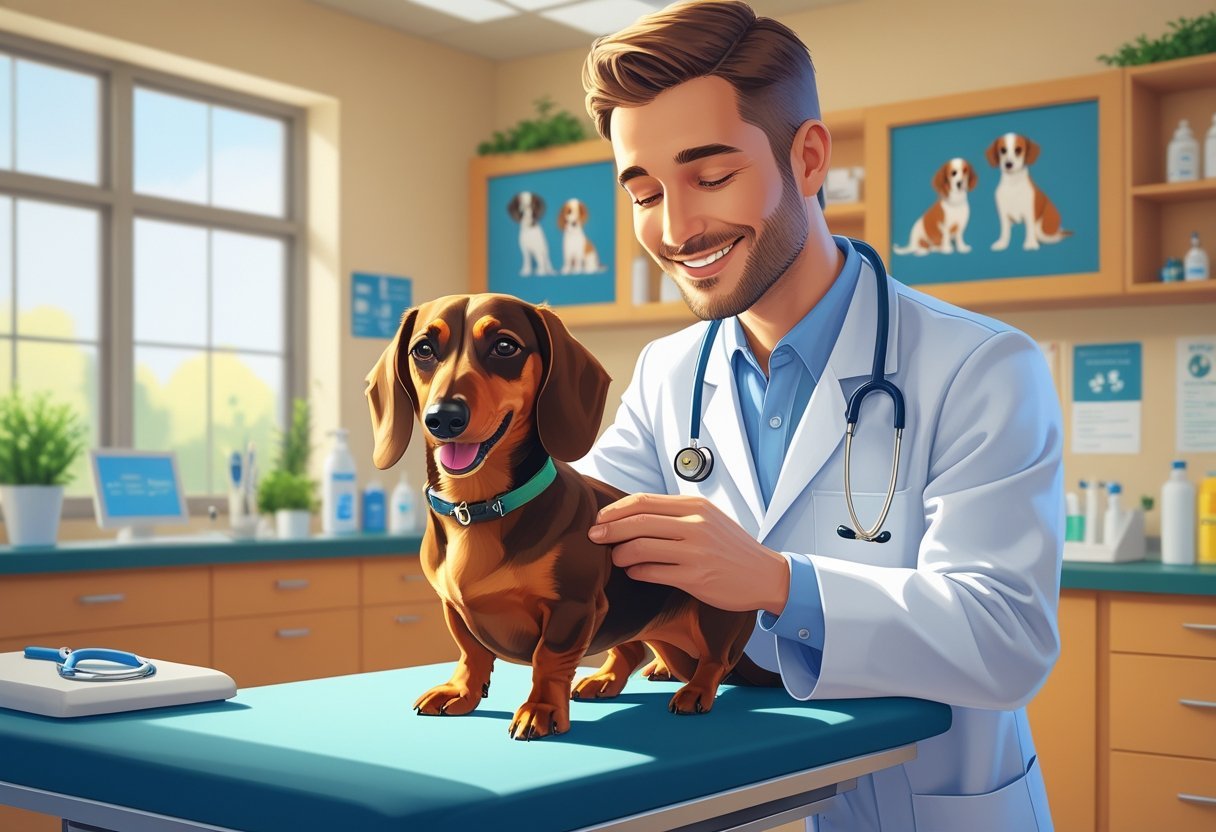Finding the right vet for your dachshund 🐾 can really change your dog’s health and happiness 🌟. A key factor in choosing vet for dachshund is the availability of emergency care 🚑. Picking a vet who knows dachshunds means your doxie gets care tailored to their needs ❤️.
A vet who understands the breed’s health problems, like back issues 🦴, will spot trouble early and offer advice for long-term care 🩺.
You want a clinic that feels clean 🧼 and friendly 😊. The staff should take time to answer your questions, not just rush you out the door ⏳.
Vets with small breed experience usually give you more peace of mind 🐶. If you make careful choices now, your dachshund has a better shot at a healthy life 🌿.
Key Takeaways ✨
- The right vet knows about dachshund health issues. 🩺
- Good clinics have friendly, knowledgeable staff. 😊
- Careful vet selection leads to better health for your dog. 🐾
🐾 Free Dachshund Care Guide
Download our free checklist to ensure your Dachshund stays happy, healthy, and well-loved!
Get Your Free Guide 🐶Why Choosing the Right Vet for Your Dachshund Matters
Your Dachshund has some unique health needs 🐾. Choosing the right vet helps manage these challenges 🩺.
The right care prevents problems, catches issues early ⏳, and keeps your dog comfortable and happy as they age 🌟.
Dachshund-Specific Health Considerations 🐶
Dachshunds are prone to several health problems that vets need to know how to handle 🩺. One of the big ones is Intervertebral Disc Disease (IVDD) 🦴, a spine problem that can cause pain or even paralysis ⚠️.
A knowledgeable vet will know how to help prevent and manage IVDD 💡. They’ll guide you on safe exercise, weight control, and what signs to watch for 👀.
Ear infections are common too, thanks to those long, floppy ears 👂. The right vet checks their ears at every visit and teaches you how to clean them properly 🧼.
Some Dachshunds also deal with dental issues 🦷, obesity ⚖️, or heart disease ❤️. A vet with doxie experience keeps a close eye on these risks 👩⚕️.
They’ll recommend X-rays, dental care, and vaccines as needed 💉, making sure your pet stays protected 🛡️.

🌿 Wild Earth Complete Protein — Clean, Calm Nutrition
Vet-developed, plant-based food that supports steady energy, healthy weight, and gentle digestion—ideal for sensitive Doxies.
- High-quality, animal-free protein for daily vitality 🐾
- No fillers or artificial nasties—just thoughtful ingredients 🌱
- Helps maintain focus and a balanced mood at home 🧘
The Role of a Good Veterinarian in Lifelong Care 🌿
A good vet becomes your Dachshund’s health partner for life 🤝. Regular checkups help spot problems early ⏱️, so you can treat them before they get worse 📋.
Vaccine schedules, diet advice, and dental cleanings are all part of routine care 🐕. An experienced vet helps you adjust your plan as your dog gets older 🐾.
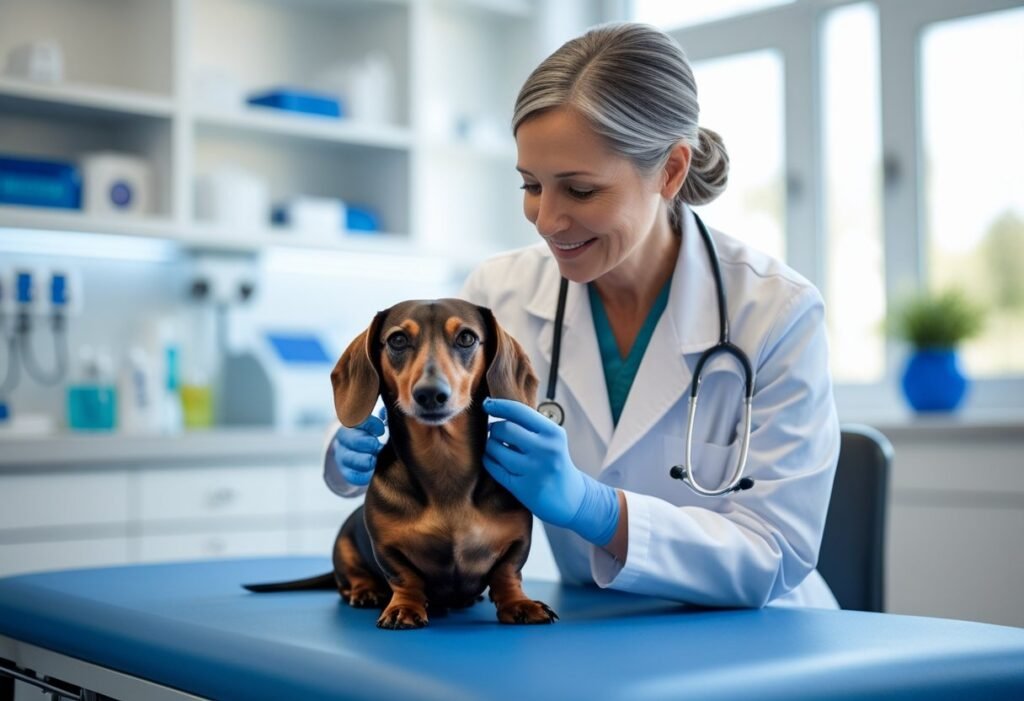
If your dog ever needs surgery—like for IVDD or dental disease—a vet who knows Dachshunds can handle anesthesia and recovery with extra care 🛏️.
Open communication matters a lot 💬. The best vets explain results, answer your questions, and actually listen to your concerns 👂.
This builds trust and helps you feel confident about every health decision you make for your Doxie 🌟.
Impacts on Your Doxie’s Quality of Life ✨
The right vet does more than just fix problems 🩺. They help your Dachshund stay happy and active for as long as possible 🐕.
Pain management is huge 💊, since back problems and arthritis can really slow a Doxie down 🐾. Keeping your dog at a healthy weight and up to date with vaccines also makes a big difference 🌿.
Some vets offer physical therapy 🏃♂️, mobility aids, or special diets to boost comfort 🍎. When your vet really knows your dog, they’ll spot small changes early and get care started fast 🚀.
That means more good days for your Doxie 🌞—and a little more peace of mind for you ❤️.
Essential Qualities to Look for in a Vet for Dachshunds
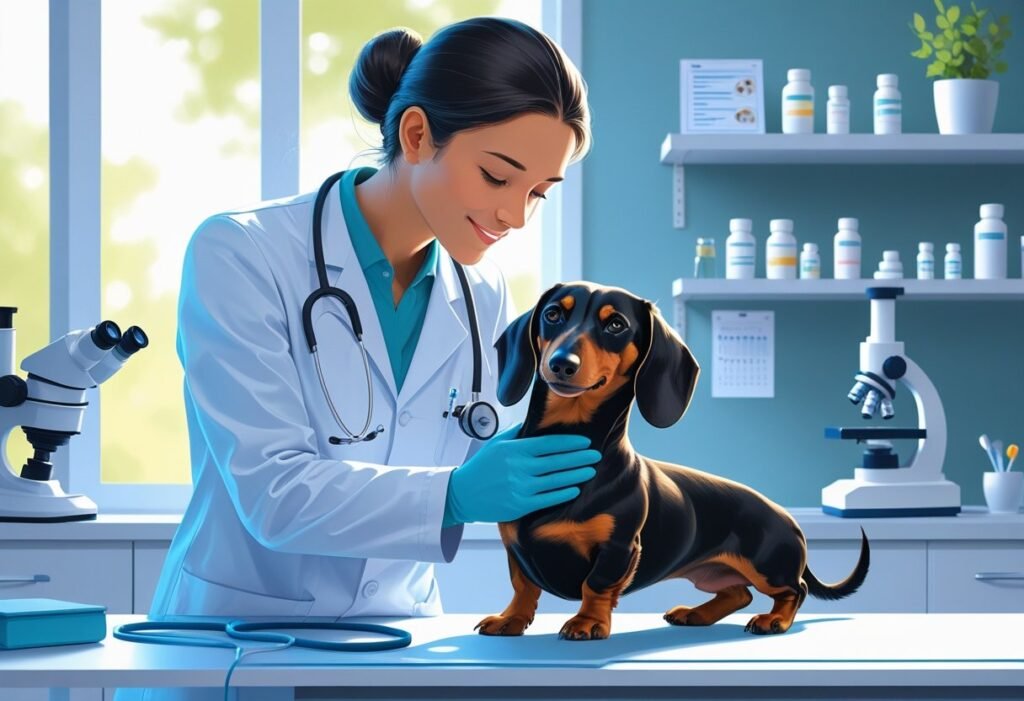
Picking the best vet for your Doxie is a big deal for their long-term health 🐾. Pay attention to a vet’s skills, the clinic itself 🏥, and their background before you decide 📝.
Experience With Small Breed Dogs 🐶
Find a vet who works with small breed dogs all the time 🐕. Dachshunds are smaller than most breeds, and their care is different 🌟.
A vet who’s used to small dogs is more likely to handle your Doxie gently and safely ❤️. Ask how many Dachshunds or other small breeds the vet sees each year 📊.
Small breed vets understand anesthesia risks, safe medication dosages 💊, and how stress affects little dogs 😌. They’ll notice early signs of pain or illness that some big dog vets might overlook 👀.
If you’re comparing vets, ask for references or check reviews that mention small dog care 📝. Watch how the staff treats small dogs when you visit, too 👩⚕️.
Here’s a checklist to help you:
| Criteria | Why It Matters |
|---|---|
| Treats small breeds often | More practice with handling and health 🐾 |
| Knows about small dog behavior | Can spot signs of distress or fear 😟 |
| Comfortable with Dachshunds | Special handling for long bodies 🦴 |

🎥 Petcube Cam 360
- Pan–tilt view to check posture, rest, and routines at home 🏠
- Smart alerts to spot changes worth asking your vet about 🔍
- Peace of mind when you’re away—see your Doxie in a tap 💛
📍 Tractive DOG GPS Health Tracker
- Live tracking + escape alerts for quick, calm recoveries 🚀
- Activity & sleep trends you can discuss at checkups 🩺
- Lightweight fit for small breeds—comfort on every walk 🐕

Knowledge of Dachshund Health Issues 🩺
Dachshunds face health problems like IVDD 🦴, dental issues 🦷, and obesity ⚖️. The best vet for Doxies knows these risks inside and out 📚.
Ask if the vet has treated Dachshunds with back problems before ❓. If your Doxie suddenly has pain or trouble walking 🚶♂️, quick care can make all the difference ⚡.
It’s helpful if the clinic has X-ray equipment or can refer you to a specialist quickly 🖼️. Vets with Dachshund experience often suggest ways to prevent injuries or catch problems early 🌿.
They’ll talk about weight management, safe exercise 🏃♂️, and the right nutrition for long-backed dogs 🍎.
Here’s what a good Dachshund vet should know:
- Signs and care of IVDD 🦴
- Proper weight and diet tips ⚖️
- Dental care for small mouths 🦷
- Safe activity advice 🌿
Communication and Trustworthiness 💬
You need a vet who listens and answers your questions in plain English 🗣️. Trust comes from real, honest communication 🤝.
A good dog vet takes time to explain what’s going on during checkups 🩺 or if your Dachshund gets sick 🤒. They won’t rush you out ⏳ or dodge questions about medication, treatment, or costs 💵.

Look for a vet who welcomes your questions about your Doxie’s care ❓. You should feel comfortable following their advice and trusting their judgment 🌟.
If something doesn’t make sense, your vet should explain it simply 📖. This helps you work together and gives you more confidence in your choices ✅.
For better communication, ask:
- How do you update owners about test results? 📊
- Are follow-up visits explained clearly? 📝
- Can you email or call with questions? 📧

🍲 ChefPaw Fresh Food Maker
- ✅ Fresh, portioned meals you control
- ✅ Small-breed friendly batch cooking
- ✅ Simple, clean ingredients—no guesswork

🩺 The Swiftest Insurance Comparison
- ✅ Compare plans fast in one place
- ✅ Check IVDD & orthopedic terms upfront
- ✅ Find coverage that fits your Doxie & budget
Clinic Location and Accessibility 📍
Distance and travel time matter, especially in an emergency 🚑. The best vet for Doxies should be close enough for quick visits if something urgent happens ⚡.
Check the clinic’s hours, parking 🚗, and how easy it is to get a same-day appointment 📅. Some Dachshund problems, like IVDD pain 🦴, really can’t wait ⏱️.
Ask if the clinic offers emergency services 🚨. The waiting area should feel comfortable and not too noisy 🔇, so your dog stays calm 😌.
If you don’t drive, check public transport options 🚌 or see if the clinic knows any pet taxi services 🚕.
Take note of:
- Clinic’s distance from home 📍
- Parking and entry for pets 🚗
- Emergency and after-hours care availability 🚑
Evaluating Veterinary Clinics for Your Doxie
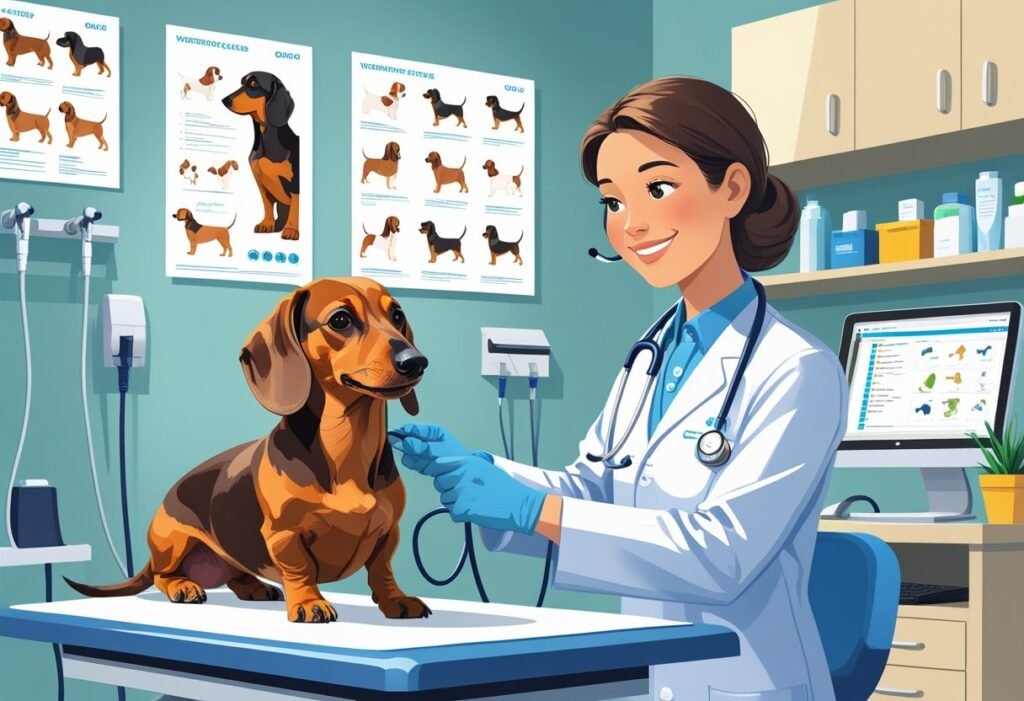
Your dachshund needs care in a safe, well-equipped place 🐾. The right clinic has skilled staff and solid service 🏥, and they’re ready for emergencies 🚑.
Facility Cleanliness and Equipment 🧼
A clean clinic lowers the risk of infections 🛡️. Look for spotless floors, walls, and exam tables—no weird smells or sticky spots 👃.
Exam rooms should have fresh tools and supplies 🩺. Medical equipment needs to look modern and well-kept ⚙️.
Clinics using up-to-date tools can diagnose and treat your dachshund more accurately 📊. Ask how often they clean and what steps they take between each pet visit 📅.
Sanitizing between patients and regular deep cleaning both matter for your dog’s safety 🌿. High cleanliness standards show the clinic cares about your pet’s health ❤️.

⏰ PETLIBRO 5G Auto Feeder
- ✅ Schedule small, consistent portions
- ✅ Optional voice call for reassurance
- ✅ Keeps routine steady when you’re away

💧 PETLIBRO Water Fountain
- ✅ Flowing water encourages drinking
- ✅ Filters help keep water fresh
- ✅ Quiet design for a calm home
Staff Friendliness and Expertise 😊
Friendly staff make every visit easier on your dachshund 🐕. Notice how receptionists, techs, and vets greet you and your dog 👋.
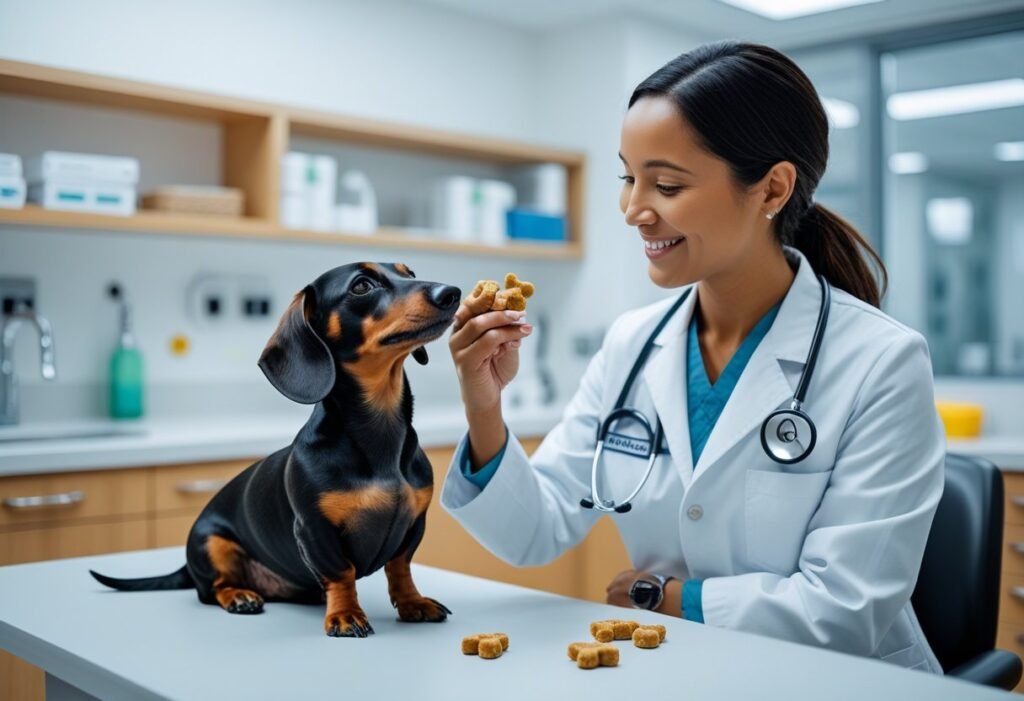
🎉 Grab your free Dachshund care checklist!
Ask about the vets’ education and special training 🎓. Dachshunds have unique needs—like back and joint problems 🦴. An experienced vet knows how to spot and treat these issues early 🔍.
It helps if the staff can explain things in clear, simple words 🗣️. Being open about costs, treatment options, and care instructions keeps you in the loop and comfortable with your decisions ✅.
Emergency Care Availability 🚨
Emergencies can pop up anytime ⏱️, so your clinic should have a solid plan 📋. Some clinics offer 24/7 help 🌙, while others work with local emergency centers 🏥.
Ask what you should do if your dachshund needs help after hours 📞. Get emergency contact info 📇, and find out if the clinic can handle serious problems like injuries or sudden illness ⚠️.
Make sure the clinic has lifesaving tools like oxygen and IV fluids 💧. Staff should know emergency procedures and be able to respond quickly if your dog needs help right away 🐾.
Understanding Common Dachshund Health Needs
Dachshunds have unique health needs you should keep in mind when choosing a vet 🐾. Their long backs, vaccine schedules 💉, and diet 🍎 all play a part in keeping them well 🌟.
Back and Spine Health Requirements 🦴
Dachshunds have those long backs and stubby little legs 🐕. This quirky shape puts them at higher risk for back injuries and spine problems ⚠️, especially intervertebral disc disease (IVDD) 🩺.
IVDD can cause pain, mobility trouble 🚶♂️, and sometimes even paralysis 🚫. You might notice your doxie skipping stairs or jumping in a weird way 👀.
Regular vet visits help catch back issues early ⏱️. Vets often suggest weight management ⚖️ and daily exercise 🏃♂️.
They’ll probably tell you to keep jumping and rough play to a minimum 🚫. Instead of stairs, ramps are easier on their backs 🛤️.
Harnesses work better than collars for walks 🐾. Some vets like to recommend specific exercises or physical therapy 🏋️♂️ to keep those spine-supporting muscles strong 💪.
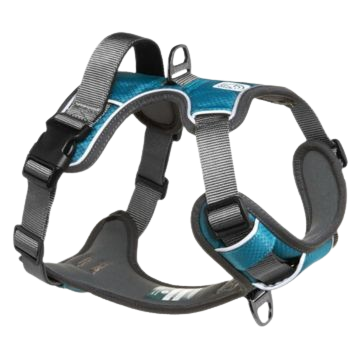
🎽 Embark Pet Adventure Harness
- ✅ Provides secure, gentle control during vet visits or travel
- ✅ Reduces pulling and pressure on the neck — great for anxious pups
- ✅ Ideal for keeping your Doxie calm and comfortable in busy clinics

🪜 Majestic Pet Stairs
- ✅ Helps your Doxie move safely before and after vet checkups
- ✅ Prevents strain on joints and back — essential for recovery care
- ✅ Encourages independence while minimizing injury risk
Vaccination Protocols for Dachshunds 💉
Vaccinations keep dachshunds safe from things like parvovirus, distemper, and rabies 🛡️. Puppies start their shots around 6-8 weeks 📅, and need boosters every 3-4 weeks until about 16 weeks old 🐶.
Your vet will make a vaccine schedule 📝. Dachshunds sometimes have sensitive immune systems ❤️, so spacing out shots and watching for side effects is smart 👀.

Non-core vaccines—like Lyme or bordetella—might be needed if your dog goes to daycare, gets boarded, or spends lots of time outside 🌳. Always keep a record of your dachshund’s vaccinations 📇.
Remind your vet if your dog ever had a reaction or allergy ⚠️. Staying on top of shots keeps your doxie safer—simple as that ✅.
Nutrition and Weight Management Guidance 🍎
Keeping your dachshund slim helps their back and joints 🦴. Vets usually recommend high-quality dog food 🍲 with balanced protein, fat, and calories for their age and energy level ⚡.
Too many treats or table scraps? That’s a fast track to weight gain and more back problems 🚫.
Your vet might suggest:
- Portion control 🍽️
- Regular weigh-ins ⚖️
- Low-calorie treats 🥦
- Special diets for health issues 🌿
Daily exercise—think moderate walks 🚶♀️ and gentle play 🎾—helps keep weight in check. Ask your vet what weight is best for your dachshund 📏.
Regular checks make it easier to catch small weight changes before they get out of hand 🔍.
Tips for Finding and Selecting the Best Vet for Doxies
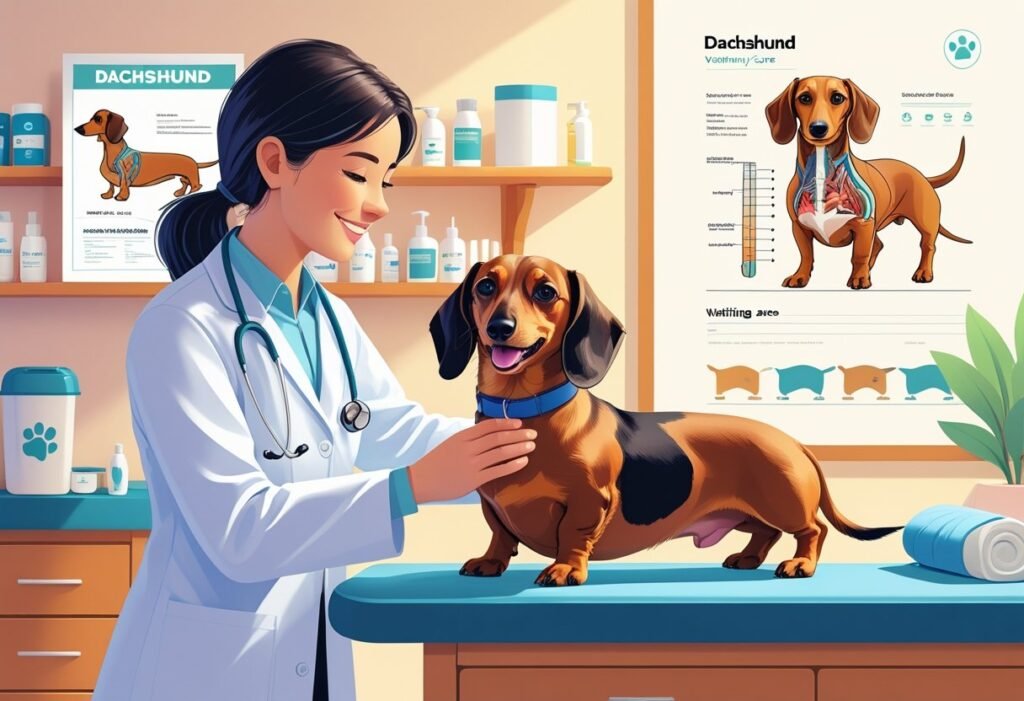
Picking a vet for your Dachshund isn’t just about convenience 🐾. You want someone who really gets the breed 🐕 and makes you feel comfortable 🌟.
The process usually starts with asking around, checking reviews 📋, and dropping by clinics to get a feel for the place 🏥.
Seeking Recommendations From Other Dachshund Owners 💬
Start by asking Dachshund owners in your area who they trust 🤝. Folks with Doxies know about the breed’s health quirks, like back trouble 🦴 or dental issues 🦷.
Ask friends, neighbors, or local Dachshund groups for names 🗣️. People love to share both the good and the bad ⚖️.
They’ll tell you which clinics are gentle with long-bodied dogs 🐕, or which vets explain things in plain English 📖. If you’re lucky 🍀, they’ll even give tips on who’s patient about weight management ⚖️ or preventative care 🌿.
Social media groups can be goldmines for this stuff 💎. Most cities have Facebook pages just for Dachshund fans 📱.
Dog parks 🐶 and breed clubs 🎯 are good places to swap stories and get honest recommendations ✅.

🌿 Innovet Pet CBD Oil
- ✅ Eases anxiety & stress naturally
- ✅ Vegan, pet-safe formula
- ✅ Helps with relaxation during vet visits

🧠 Brain Training for Dogs
- ✅ Mental stimulation to curb boredom
- ✅ Builds confidence in anxious dogs
- ✅ Fun, positive games for all ages
Online Reviews and Research 🔍
Hop onto Google, Yelp, or Facebook 💻 and browse the reviews for local vets 🌟. Check both the glowing and grumpy ones 😅 to get a real sense of the place.
Look for comments from Dachshund owners or people with small dogs 🐾. Phrases like “gentle,” “knows Dachshunds,” or “explains health issues” stand out ✨.

Make a shortlist 📝 of clinics with solid ratings ⭐ and plenty of feedback 🗨️. If you keep seeing complaints about rude staff or rushed appointments ⏳, that’s a red flag 🚫.
Poke around the clinic’s website too 🌐. See if they mention Dachshund care 🐕, advanced imaging 🖼️, or orthopedic support 🩺.
Staff bios sometimes show off their special interests 🎓 or experience, which can be helpful 📚.
Trial Visits and Observations 👀
Set up a visit before you commit 📅. Walk in 🚶♂️, check how clean it is 🧼, watch how the staff treats pets and people 🐶, and see if the vibe fits your dog’s needs 💖.
Watch how they handle Dachshunds (if you get the chance) 🐾. Do they lift them right? Are they friendly and willing to answer your questions ❓.
Ask directly about their experience with Dachshunds 💬. Be upfront about your dog’s quirks 😄 and any health issues 🩺.
Bring a list of questions 📝—like what emergencies they handle 🚨, or what special gear they have for small or long-bodied dogs 🦴. Comparing a few clinics helps you find the right fit for your doxie ❤️.
Building a Lasting Relationship With Your Vet
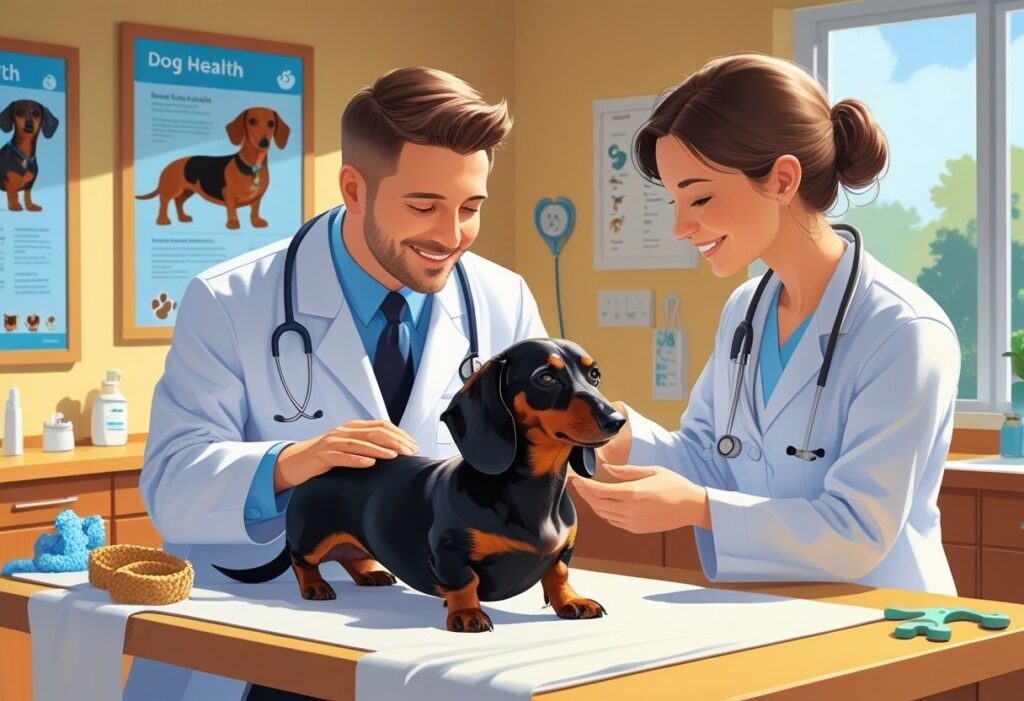
Your vet isn’t just a doctor—they’re a partner in your dachshund’s health 🐾. Keeping regular appointments 📅 and being honest about changes 💬 helps catch problems early ⏱️.
Regular Checkups and Preventive Care 🩺
Book annual or twice-a-year checkups for your dachshund 🐕. Regular visits let your vet watch for early signs of back trouble 🦴, skin issues 🌿, and dental disease 🦷.
Jot down any weird habits or symptoms to bring up 📝. Make sure your vet checks weight ⚖️, teeth 🦷, ears 👂, and nails ✂️.
Ask for tips on flea, tick, and heartworm prevention 🛡️. Stay on top of vaccinations 💉 and blood tests as your vet recommends 📋.
Here’s a quick table to track routine care:
| Care Type | How Often | Notes |
|---|---|---|
| Vet Checkup | 1–2 times/year | Monitor back health 🦴 |
| Vaccinations | As advised | Stay up-to-date 💉 |
| Dental Cleaning | 1 time/year | Reduce risk of gum disease 🦷 |
| Parasite Prevention | Monthly | Flea, tick, and heartworm care 🛡️ |
| Weight Check | Each visit | Important for spinal health ⚖️ |
🩺 Vet-Visit Essentials to Keep Your Doxie Calm & Prepared
- 📹 Petcube Bites 2 — Monitor your Dachshund before, during, and after vet visits; toss treats remotely to reward calm behavior and reduce appointment stress.
- 🛌 Majestic Pet Orthopedic Bed — Give your Doxie supportive rest after procedures or long vet days; proper bedding aids healing and lowers stress during recovery.
- 🧼 Pride + Groom Grooming Tools Kit — Gentle grooming helps you check skin, ears, and incision sites between visits and builds tolerance for hands-on exams at the clinic.
- 🧬 AnimalBiome Gut Health Test Kit — Collect vet-ready gut data to help diagnose digestive or behavior-linked issues; sharing results speeds up targeted treatment plans.
Clear Communication About Health Changes 💬
Keep things open and honest with your vet 🤝. If you notice limping 🚶♂️, mood swings 😊, appetite changes 🍎, or weird bathroom habits 🚽, call your vet right away 📞.
Bring notes or photos if you spot new symptoms 📸. Don’t be shy about asking questions ❓, especially if something doesn’t make sense 🤔.
If you’re not sure about a treatment, say so—ask about other options 🔄. Make sure the clinic has your up-to-date contact and emergency info 📇.
If your doxie has a known allergy or medicine reaction ⚠️, remind the staff each time you visit 🐾.
Resources for Ongoing Dachshund Health Support

Staying connected and informed makes caring for your Dachshund a little easier 🐾. Breed-specific clubs and trustworthy resources 📚 can help you spot issues before they get serious ⚠️.
Dachshund Clubs and Breed Organizations 🐕
Joining a Dachshund club connects you with experienced owners and breeders 🤝. These groups often send out newsletters 📰, run local events 🎯, and share vet recommendations 🩺.
Online forums are common, too 💻—you can ask about health or behavior and get real answers 💬.
Here’s a quick peek at what’s out there:
| Organization | Benefits | Website |
|---|---|---|
| Dachshund Club of America | Health seminars, breeder network 🐾 | dachshundclub.org |
| Local breed clubs | Regional events, adoption info 🏡 | Search your city/area 🔍 |
Getting to know other members helps you find trusted vets with Dachshund experience 🌟. Clubs keep you updated on health testing 🧪, common issues, and new treatments 💊.
💛 Vet-Visit Confidence Boosters & Gentle Care Essentials for Your Doxie
- 🎽 Coastal Pet Harness (IVDD Version) – Keep your Dachshund safe and supported during vet visits. This lightweight harness reduces neck strain and gives you full control in busy environments.
- 🌿 Zumalka Calmpet CBD Drops – Natural homeopathic drops that calm anxiety and fear before vet appointments, making the whole experience smoother for your Doxie.
- 🧴 King Klean Dog Shampoo – A soothing, anti-itch shampoo that keeps your Dachshund’s coat and skin healthy between vet visits while providing a relaxing spa-like experience.
- 🎨 Purr & Mutt Personalized Dachshund Art – Capture your Doxie’s brave little personality in custom art. A perfect keepsake to celebrate their health and resilience.
- 👕 Dog is Good Apparel & Gifts – Show your love and pride with uplifting Dachshund-themed apparel that reminds you to stay positive through every vet journey.
🩺 Gentle handling, calm routines, and trusted products make every vet visit easier — keeping your Doxie healthy, confident, and happy.
Continuing Education for Owners 📖
Learning never really stops with a Dachshund 📚. Veterinary groups 🏥, animal hospitals, and trainers offer classes and webinars 💻 on everything from back problems 🦴 to nutrition 🍎 and behavior 🐕.
Here are a few ways to keep up:
- Watch webinars from American Kennel Club (AKC) 🎥
- Read Dachshund-specific books or guides 📖
- Go to local vet or breed workshops 🏥
Using these resources helps you catch health problems early ⏱️. Most of them use plain language, so you don’t need a science degree 🎓 to get the advice.
Your vet might even recommend articles or videos to check out at home 🏡.
🐾 Don’t Miss Out!
Download our free Dachshund care guide to keep your furry friend happy and healthy.
Get Your Free Guide 🐶Frequently Asked Questions
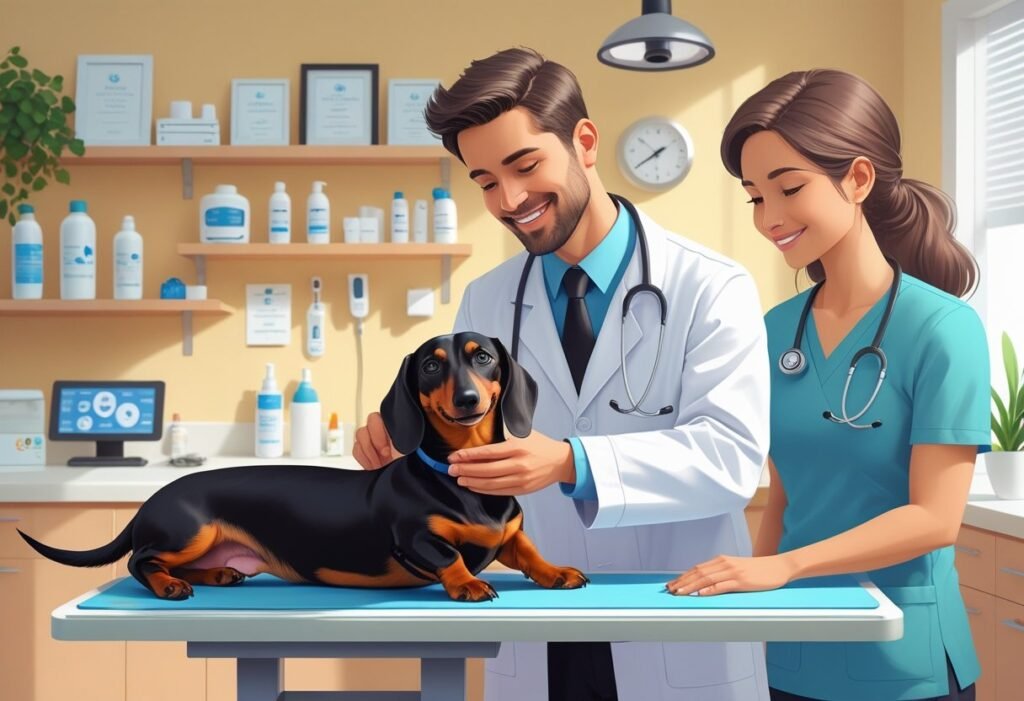
It’s really worth finding a vet who knows Dachshunds 🐾 and small breeds 🐕. Pay attention to the clinic’s vibe 🌟, the staff’s experience 🎓, and what kind of care or advice they offer for your Doxie ❤️.
What should you consider when selecting a vet for a small breed dog like a Dachshund? 🩺
Look for a vet who understands Dachshund health issues 🦴, like back and dental problems 🦷. The clinic should have experience with small breeds 🐶 and offer gentle handling 🤲 and the right equipment ⚙️.
It helps if the location is convenient 📍 and the hours are flexible ⏱️. Clear communication 💬 makes visits less stressful, too 😌.
How can I assess the qualifications and experience of a veterinarian for my Dachshund? 📋
Check if the vet is licensed 🎓 and has worked with small breeds 🐕. Ask how often they see Dachshunds 🐾, and if they’ve handled common Doxie health problems 🩺.
Reading reviews 📖 or getting references from other Dachshund owners 🗣️ can be super helpful 🌟.
What are the signs of a good veterinary clinic for Dachshund health needs? 🏥
A clean, organized clinic 🧼 is a good start. The staff should be friendly 😊, patient 😌, and willing to answer your questions ❓.
Look for modern equipment ⚙️ and clear explanations for treatments 📖. Emergency care 🚑 and solid follow-up support 📞 matter, too.
How often do Dachshunds need vaccinations, and can this affect my choice of veterinarian? 💉
Dachshunds get their core vaccines as puppies 🐶. Boosters usually happen every one to three years 📅, but some clinics might do things differently 🔄.
It’s worth asking your vet about their schedule 📝. Some places keep better track of vaccine records 📇 than others, and reminders for your Doxie’s shots can make life a lot easier ✅.
What kind of special care considerations should my vet be aware of for my Dachshund? 🌿
Dachshunds face a real risk for back injuries 🦴, dental disease 🦷, and obesity ⚖️. Your vet needs to handle your Doxie gently during exams 🤲—it’s not something every clinic remembers 📌.
Honestly, I’d want a vet who knows the warning signs of intervertebral disc disease ⚠️ and has some experience managing Dachshund weight ⚖️. These little dogs need a bit of extra attention 💖, and not every vet is up to speed on that 📚.
Can you recommend preventative care measures that a vet should discuss for a Dachshund’s well-being? 🐾
Your vet will probably bring up weight control ⚖️. Dachshunds can put on pounds pretty easily 🍎, so that’s something to watch 👀.
Regular exercise matters 🏃♂️, but you don’t want them leaping off furniture 🚫. Training to avoid those jumps 🎯 helps protect their backs 🦴.
Dental checkups are huge 🦷 for these little guys. Teeth cleaning isn’t just cosmetic—it’s about real health ❤️.
It’s smart to ask about preventing ticks, fleas, and heartworms 🛡️. These pests can cause way more trouble than you might expect ⚠️.
As your Dachshund gets older 📅, regular health screenings 🩺 become even more important 🌟. Staying ahead of problems is always better than scrambling to fix them ✅.

